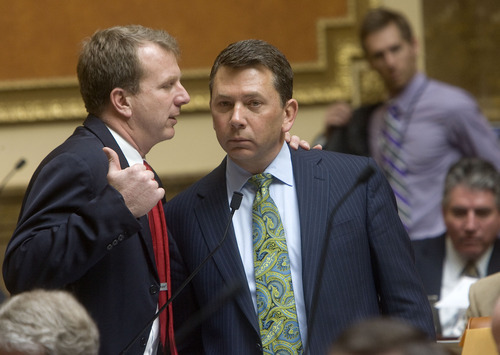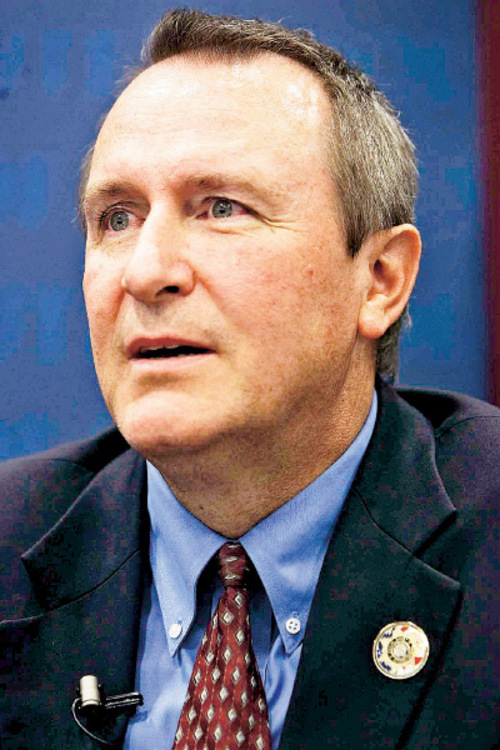This is an archived article that was published on sltrib.com in 2011, and information in the article may be outdated. It is provided only for personal research purposes and may not be reprinted.
Federal prosecutors will visit Utah later this month to evaluate whether the U.S. Department of Justice should join civil liberties groups suing the state for its enforcement-only immigration law, state officials said Thursday.
Two assistant U.S. attorneys are expected to meet with Attorney General Mark Shurtleff, giving him the chance to illustrate differences between Rep. Stephen Sandstrom's HB497 and the enforcement-only immigration bills in Alabama and Arizona that the Justice Department did contest.
Shurtleff noted that it's been five months since the Utah case was filed in U.S. District Court and that the federal government hasn't jumped in yet.
"My impression has been that they haven't wanted to get involved because they recognize Utah is doing something different," Shurtleff said. "But I also think there is a lot of political pressure to join the lawsuit. There are no guarantees."
Shurtleff and Sandstrom believe their cause is helped by the recent ruling from U.S. District Court Judge Sharon Blackburn, who upheld much of Alabama's law targeting undocumented immigrants.
That law requires local police to investigate the legal status of suspected undocumented immigrants during any police stop, requires public primary and secondary schools to check the legal status of students and makes it a felony for any undocumented immigrant to enter into a "business transaction" with the state of Alabama. The Sept. 27 ruling allowed the law to take effect almost immediately.
Sandstrom, the Orem Republican who carried HB497, said the Alabama law "went too far," in contrast with Utah's "measured approach."
"Having people report kids at school and putting fear in people I just don't think is a reasonable approach," he said.
Under Utah's law, officers are not required to check legal status when stopping people for class B or C misdemeanors but they will verify status for a person arrested and booked on those crimes.
There are no provisions requiring schools to check the immigration status of students in Utah's primary and secondary schools, and it doesn't prohibit undocumented immigrants from entering into "business transactions" with the state of Utah.
But Karen Tumlin, managing attorney for the National Immigration Law Center, said she believes the Utah law still violates federal immigration laws. She is arguing the cases in Alabama and Utah and said she remains hopeful the Justice Department will join the lawsuit.
"Utah can't act in attempting to regulate immigration," Tumlin said.
The Justice Department joined lawsuits against Arizona and Alabama about a month after those cases were filed. The lawsuit against HB497 was filed on May 3.
"We think the Justice Department should step in and join the lawsuit in Utah and certainly some of the most recent court papers say they are considering that," Tumlin said. "But I dare not guess on their timing."
Shurtleff asked for a delay in September and won a continuance until Dec. 2 because his office is in continued negotiations with federal prosecutors.
Officials with the Justice Department did not provide comment.
Shurtleff said they have continued to "walk through" the differences between HB497 and Alabama's law with federal prosecutors. However, he said, the rulings in Arizona and Alabama show how uncertain things can be. With Arizona's law, the court threw out large swaths of SB1070 while Alabama's was largely upheld.
"I was surprised [on the Alabama ruling] but then again, neither the judge in that case or the Arizona case had a precedent here," Shurtleff said.
But Blackburn, in her 115-page ruling, took issue with findings from both Bolton's ruling in the Arizona case as well as appeals to the 9th Circuit Court of Appeals, which upheld Bolton's findings.
The HB497 lawsuit will be heard by U.S. District Court Judge Clark Waddoups.
Twitter: @davemontero





